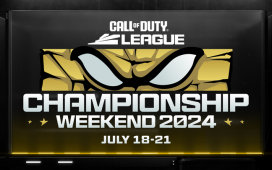Mentioned in this article
- Thirteen esports organizations will become stakeholders in the ESL Pro League Counter-Strike: Global Offensive (CS:GO) competition.
- No entry fee was required to be part of the ESL Pro League, and teams will receive revenue share from all ESL Pro Tour competitions.
- While no teams are exclusively tied to the ESL Pro League, its schedule now conflicts with FLASHPOINT—another co-owned league operated by FACEIT.
ESL has announced a commercial partnership with 13 professional esports teams, which includes ownership stakes in its CS:GO ESL Pro League. In addition, these partners will receive a share of revenue and profits from CS:GO events in the ESL Pro Tour; a combined tournament circuit of ESL and DreamHack.
Astralis, Complexity, Evil Geniuses, ENCE, FaZe Clan, Fnatic, G2 Esports, mousesports, Natus Vincere, Ninjas in Pyjamas, Team Liquid, Team Vitality, and 100 Thieves signed the informally named “Louvre Agreement” at a Paris meeting in January. Each will now retain a long term slot in the ESL Pro League and receive automatic invites to ESL Pro Tour tournaments. The agreements are multi-year, and there are no special terms for individual teams.
Ulrich Schulze, senior VP of product for ESL, told The Esports Observer that the “Louvre Agreement” was a reference to the 1981 Concorde agreement in Formula One, which introduced similar concessions and agreements for racing teams.
“No team has to pay any fees to be part of ESL Pro League,” said Schulze. “We will continue to support the format of open ecosystems, creating a world where everybody can be somebody.”
The ESL Pro League will transition from a multi-regional structure to a 24-team global competition for its 11th season, beginning March 16. Founding teams will retain a “long-term slot” regardless of season placement, though this can be reviewed in case of continued underperformance. The remaining 11 teams will qualify through the second-tier Mountain Dew League.
The initial reveal of the new league structure sparked outrage in the CS:GO community, as 24 qualified teams were dropped from the roster without warning. Schulze later apologized on Twitter for how the format change was handled.
At the beginning of February, a rival CS:GO league, FLASHPOINT, was announced with FACEIT as tournament operator and five predominantly North American-based esports companies as shareholders. The buy-in fee for this property was $2M USD, and also offered a revenue share guarantee.
In a September 2019 blog post, CS:GO publisher Valve placed a moratorium on tournament organizers holding any exclusivity agreements with teams. The conflicting schedule of the ESL Pro League and FLASHPOINT essentially creates a soft-franchising model.

“Over the entire course that this agreement was developed, we kept Valve in the loop about our plans, before and after the blog post,” said Schulze. “We work very closely with the publisher and naturally involve them in these tremendous changes.”
Teams in both leagues will still be able to compete in other CS:GO tournaments, including the two annual Valve-sanctioned Majors—the first of which will be the ESL One Rio event in May.
“Overlapping tournaments and tournaments back-to-back has been an issue for a long time in Counter-Strike, and we see a structured and better-organized scene as beneficial to all stakeholders,” Astralis Group Co-CEO Anders Horsholt told The Esports Observer.
Astralis Group and six of the Louvre Agreement signees have long-term partnerships in place with League of Legends (LoL) publisher Riot Games to compete in its professional leagues; albeit each paid upwards of $8M for their slots, and do not own shares of the competition.
“It’s two different scenarios and you can’t and shouldn’t try to copy the LoL system into the Counter-Strike scene,” said Horsholt. “We’re in this for the long term, and even though I don’t think that anybody has found the ultimate tournament model yet, we can still learn a lot across games and tournaments to build on the foundation.”
Via Twitter, Astralis Group Co-CEO Nikolaj Nyholm said the company was concerned in 2019 with the product execution and falling viewership of FACEIT’s Esports Championship Series (ECS). These issues were overcome, and Astralis signed a conditional term sheet with B Site Inc. (the company behind FLASHPOINT) that required signing two other “top teams.” The signees of the Louvre Agreement ultimately made this condition unfulfillable.
“For me it’s obvious that the discussions between ESL and the 13 founding teams has resulted in a structure and an agreement that is better than the alternatives for the teams, for the TO and ultimately for the scene,” said Hortsholt.
The World Esports Association (WESA), co-founded by ESL and featuring Fnatic, G2 Esports, mouseports, and Faze Clan as members, will not be replaced as a result of the agreement. “WESA will continue to exist and operate with its member teams for a variety of esports titles,” said Schulz. “A lot of the structures and regulations were the basis for the Louvre Agreement, but it will not have an active role in CS:GO for the foreseeable future.”














